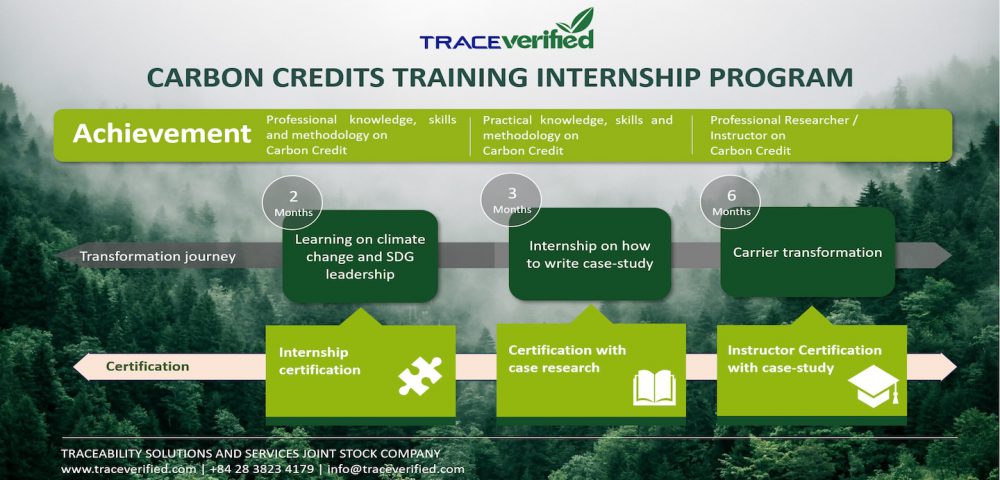Adapting to climate change and finding opportunities to provide carbon offset credits are the trending topics in Vietnam. Vietnam currently has 336 projects registered in the UNFCCC mechanism, 124 projects registered under voluntary standards, generating 37 million carbon credits. But whether these credits can be traded on the international market depends on the agreement among NDCs on OMGE and ITMO. What are these projects? Which industries do they operate in? Who invests in the project and how profitable do they make?
There is extensive documentation created in accordance with regulations, standards and scientific methodology to help stakeholders to register a project. To build these pages, a series of data sheets are calculated from financial viability to broader economic impact. However, there are still many gaps in double counting, greenwashing, and especially controversy over carbon pricing. If the same ton of carbon emissions (tCO2) impacts the Earth is purchased with a different price, do projects have the incentive to buy the low-price carbon sources to offset for the high-price carbon demands?
We are all limited in time, knowledge and resources to fully understand the above issues. So how can we understand and update the knowledge to be able to screen quality projects, learn to develop new projects, find financial sources, and participate in the carbon trading market, etc. At TraceVerified, we set up an open learning resource that turns each project into a case study of about 10 pages, with video demonstrations and questions for discussion. Do you desire to become one of the first members to play the foundation roles in the project? Putting skin in the game by applying to the Climate Change Open Case-study internship program in June 2024.
Roadmap: We develop a 3-stage roadmap: Learn, Experiment and Transformation
- Learning: We designed a curriculum teaching case writing methods, including how to read documents, contact and interview projects, methodology and evidence. In addition to knowledge about climate change and ESG, the participants will learn knowledge and skills such as unintended consequences, Pareto principle, NPV calculation, etc. Other complementary skills will be shared between team members like copywriting, choosing keywords, developing communication channels, using AI to create short videos, etc. The study plan is 2 months, every Saturday morning. Learning form: online or offline in HCMC, Vietnam. Language: Vietnamese, English or hybrid (depending on the learners’ survey)
- Experimenting: We have a database of 21,000 global SDG projects, diverse in many industries, from energy and waste to agriculture and forestry. The interns will have the opportunity to search inside themselves to find which type of projects is suitable for them to discover and mint. The interns will work individually, in groups with each other, or in groups with instructors. We continue to support hands-on communication with stakeholders and data mining techniques to develop a complete learning situation. The practice duration is expected to be in the next 3 months or sooner than your deal. The interns will work from home and have a meeting with the instructor every 2 weeks, online or offline.
- Transformation: Successful case-studies will be published on the open climate change learning resource platform. The platform is accessible to global students via English language. Depending on project areas and needs, case-study will be translated in local languages that are more convenient for learners. The interns who research and conduct the cases will receive fees paid by the learners who decide to choose those cases to read, and participate in workshops or courses of the researcher. Researchers can also organize field trips to the project. Researchers will share revenue from students. The duration to publish a case and attract learners is 6 months.
Value: Benefits for participants in the 3 stages include:
- Learning: Participants can gain knowledge about the carbon market, including methods to offset or reduce carbon emissions, carbon price mechanism; economic knowledge includes supply and demand theory, negative externalities, Pareto principle, Project financial and economic value appraisal; how to write a case-study for future use. At the end of phase 1, interns are certified to have completed the Carbon Credit Training Internship Program.
- Experimenting: Participants can directly research a specific project; be coached in data mining, document skimming and methods of approaching stakeholders; team working (or individually) to write case-study projects on carbon emissions and offsets. At the end of phase 2, interns are certified for completing the Carbon Credit Training and wiring the case-study [specific name].
- Transforming: Participants can publish case-study on the project platform and reach newbies, directly guide them to research climate change projects and share revenue from the project; You will be provided with an account, profile website and online QR code on the system. At the end of phase 3, interns are certified as Carbon Credit Trainer in the case-study [specific name].
Requirements: We plan to develop the first research group of 10 to 20 members, with a diversity of participants, regardless of academic graduation, generation or experience.
- Regarding qualifications: We value diversity from all fields, including economics, art and science, and technology. Even high school students with unique and bold perspectives on projects are welcome to participate.
- Regarding generation: We encourage a collaborative environment where participants of all ages can share and learn from each other’s diverse perspectives on the environment, society, and global governance issues.
- Regarding experience: We value your contributions, regardless of experience level. Newcomers bring fresh perspectives and can make valuable contributions.
Strong English skills are required to read academic documents, write emails to communicate with project developers, and especially be passionate about environmental and social issues.
Action: Now is the time for us to take action to adapt to the changing environment.
- Write down what you want: Please write us an A4 page of 1200 words, expressing your desire to participate in the project, upload it as .pdf in the form attached to the link here. You need to convince us by giving the reasons for choosing you as a candidate for the project core team and state your expectations when participating. Application deadline is 5:00 PM, Hanoi time, Saturday June 15, 2024
- Put skin in the game: We will need to keep a deposit equivalent to 100 USD (2.5 million VND) during your internship. The deposit will be 100% refunded when you complete the transformation period. If you do not participate in the transformation stage, the deposit cost is paid as a tuition fee during the study stage. The deposit fee will be paid after being selected through the application round expected in the first week of July 2024.
- Job opportunities: Interns can be hired to work full-time for the project and/or TraceVerified’s tasks during the internship period (depending on the intern’s needs and agreement). Hopefully, we will collaborate to create a platform for sharing knowledge, finding finance for projects for better environmental, social and governance goals, and of course we have a a better life, making money from the things we love.
About TraceVerified
TraceVerified is a leading provider of traceability solutions and services in Vietnam. In 2011, under the professional leadership of Dr. Nguyen Thi Hong Minh, former Deputy Minister of Fisheries of Vietnam, TraceVerified developed software to provide electronic traceability solutions and services to the top 50 companies exporting Vietnamese seafood to the European market. In 2016, TraceVerified JSC was established. The TraceVerified solution is recognized by the international agriculture and forestry community. With 12 years of experience in implementing traceability solutions, many large agricultural, forestry and aquaculture producers and farmers have used the solution for export and domestic markets. In the context of climate change and EU market requirements on EUDR, CBAM and carbon emissions, we are researching and providing services to companies on ESG training, consultancy and risk management. In the future, TraceVerified will be a global decentralized platform for ESG solutions.
Contact information: 0912501139 (Ms. Trinh)
Email: info@traceverified.com
Website: traceverified.com
Fanpage – Linkedin
>> Registration link: https://forms.gle/Yj4rniWTGgxYYuBh7



